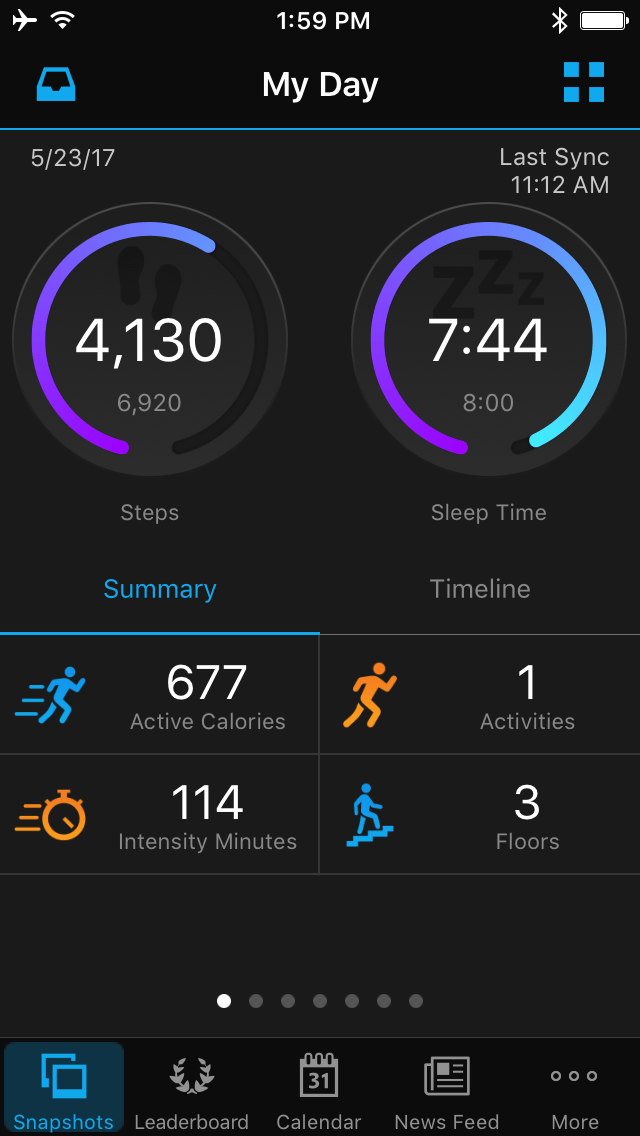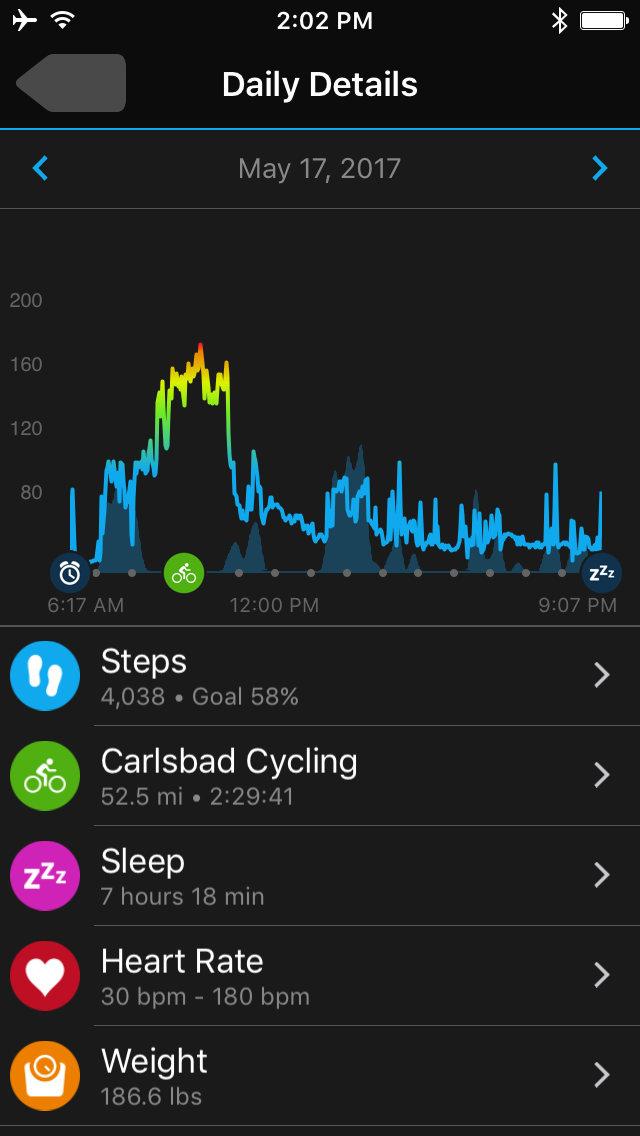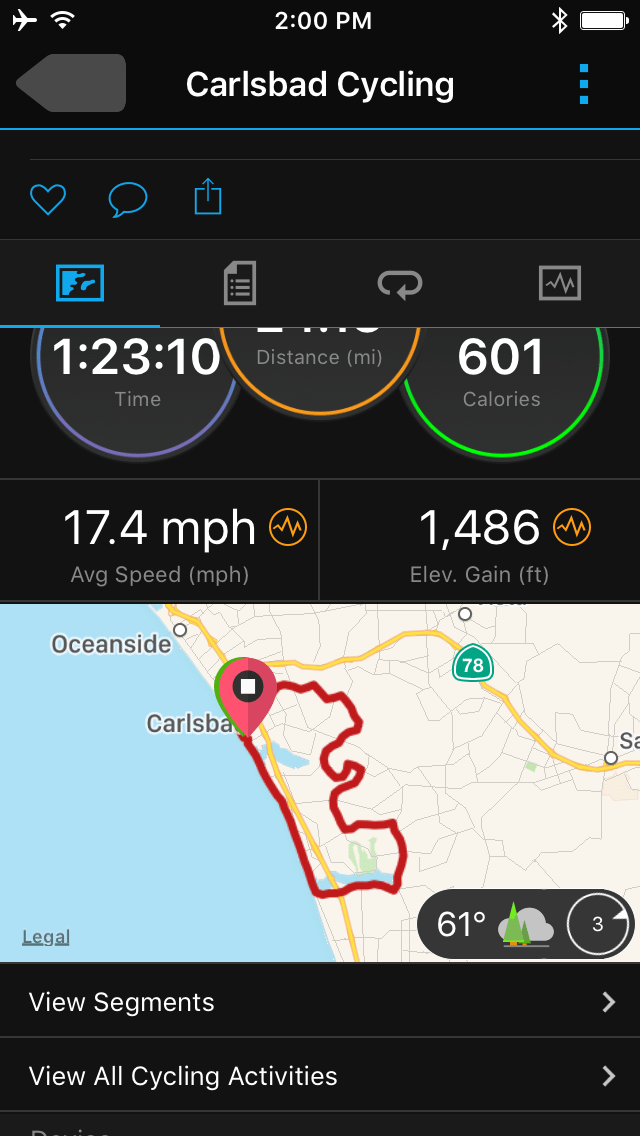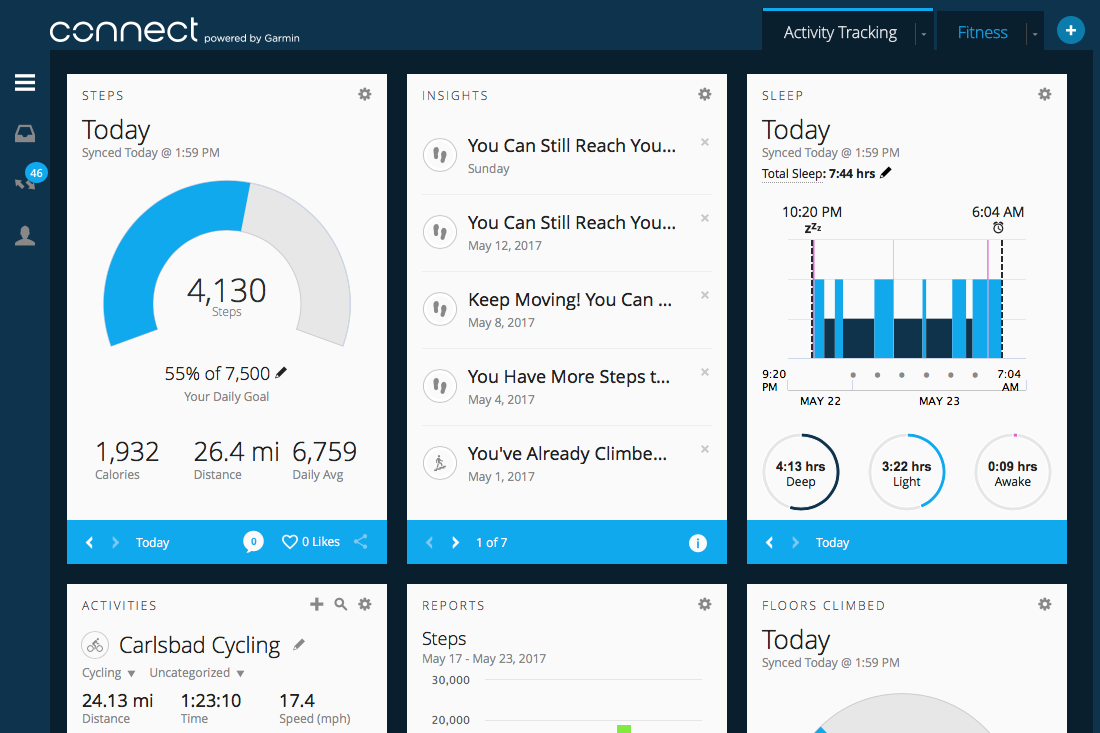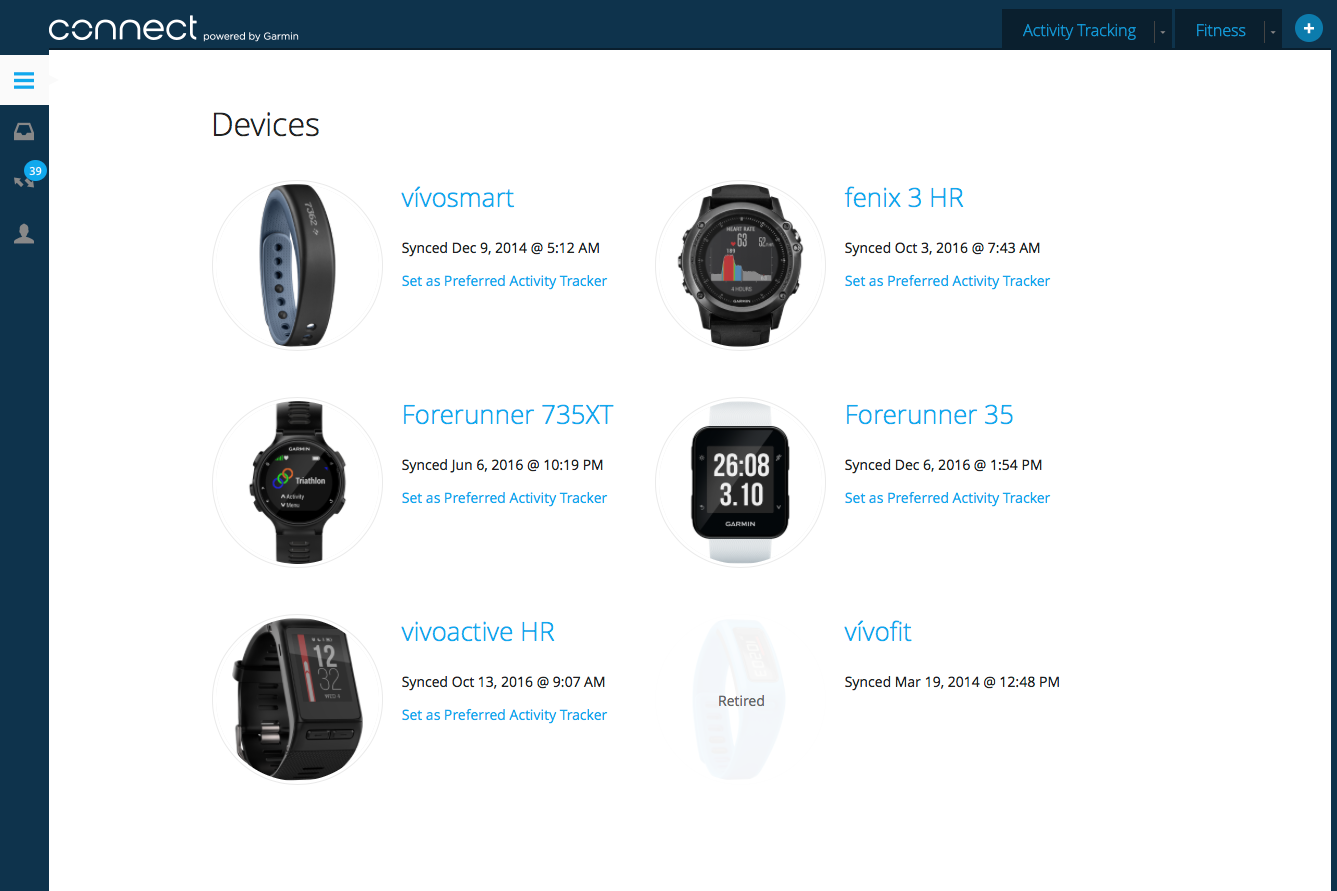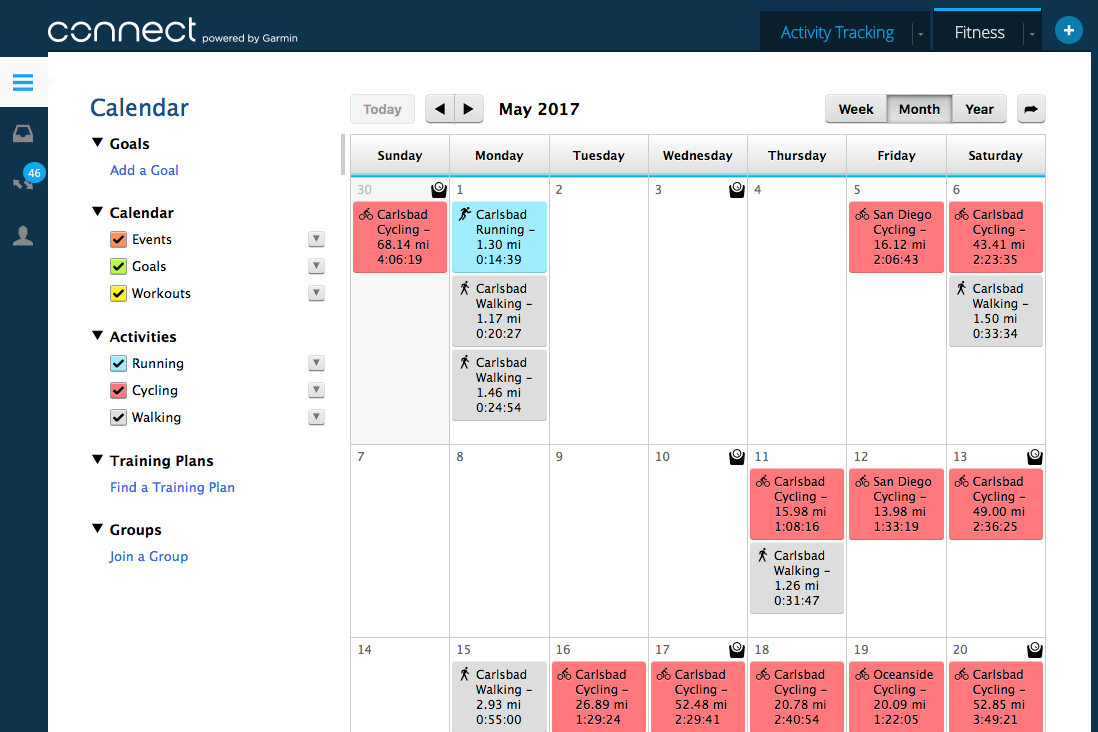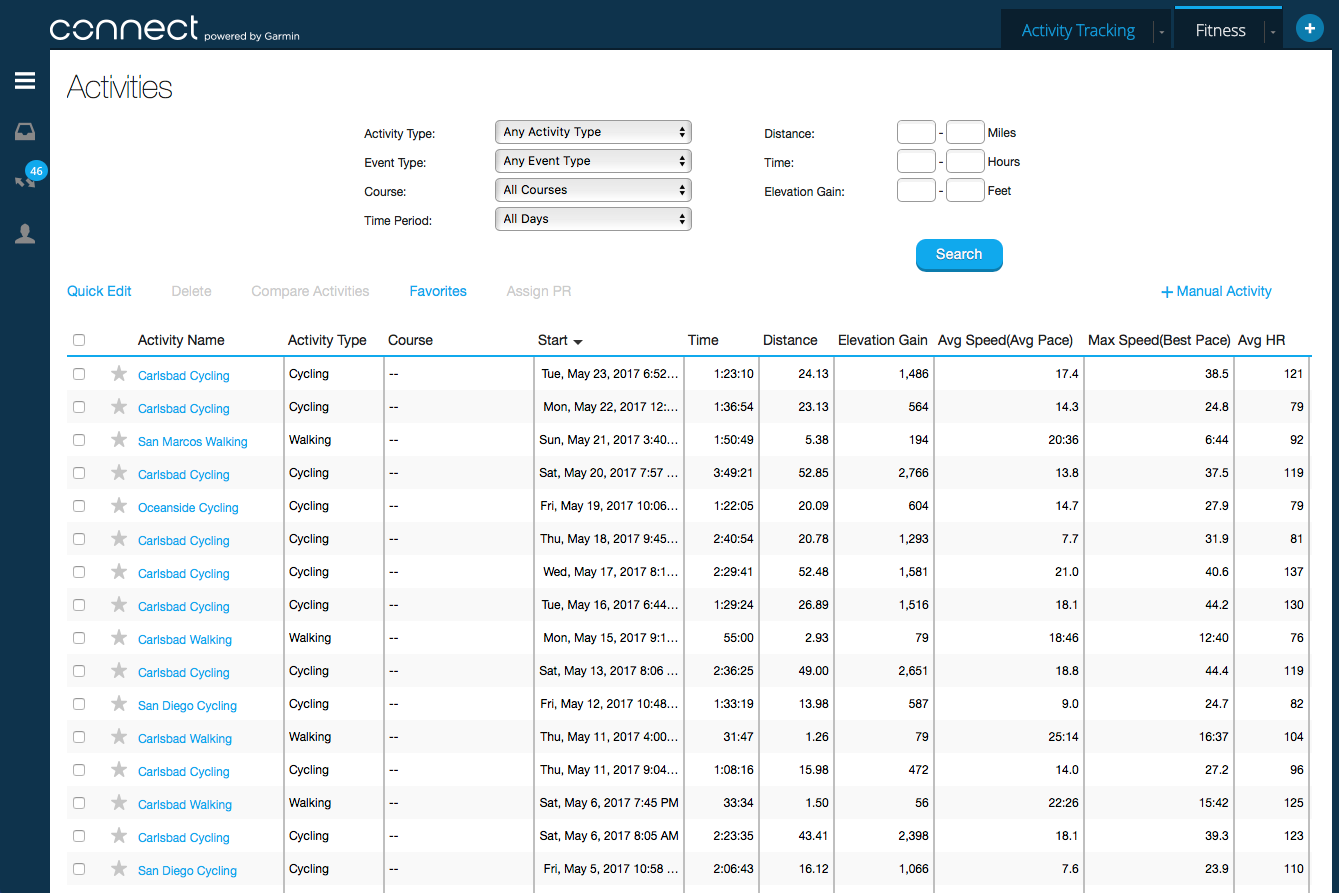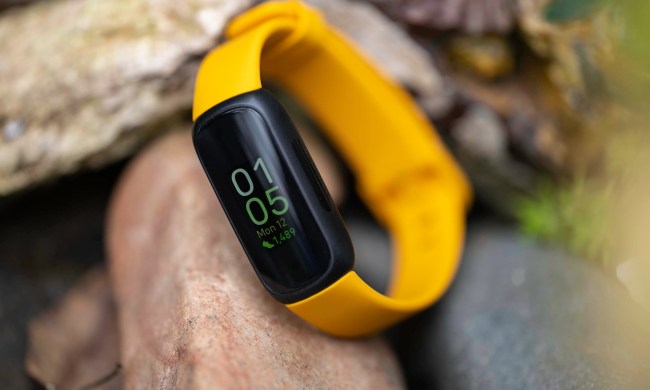- Compact size for all its tech
- Water resistant to 5 ATMs
- Smart notifications
- Strong vibration alerts
- 24/7 heart rate monitoring
- Uneven pool swim distance tracking
The newest member of Garmin’s Forerunner GPS multisport watch family is everything a fitness smartwatch should be — it tracks activities, monitors daily fitness, and delivers notifications like a good smartwatch. Though Garmin positions it as a running/triathlon watch, we discovered in our Forerunner 935 review a device equally adept at being a cycling computer, a hike navigator, or just a plain old smartwatch. During three weeks of testing it did almost everything we asked it to do — and did it darn well.
Features and design
The Garmin Forerunner 935 is an attractive, round-faced GPS multisport smartwatch that treats its copious internal technology with aesthetic humility. Featuring a glass lens, a fiber reinforced polymer case that’s water resistant to 5 ATMs, and a silicone band, the Forerunner 935 has a customizable watch face sporting a 1.2-inch color display with a resolution of 240 × 240 pixels and includes watch basics like a timer, stopwatch, and up to 10 customizable alarms with audible and vibration alerts. From the outside it’s difficult to believe that the Forerunner 935 also features a built-in optical heart rate monitor, barometric altimeter, compass, gyroscope, accelerometer, and thermometer. Or that it connects to smartphones via Bluetooth, external sensors via ANT+, and networks via Wi-Fi, because it doesn’t look big and bulky enough to hold all that tech.
Size-wise, the Forerunner 935 falls between Garmin’s Forerunner 735XT and their more rugged, outdoor GPS watch, the fenix 5. At 49 grams, the 935 is 8 grams heavier than the 735XT, but 36 grams lighter than the rugged fenix 5. The 935 is 47 mm round and 13.9 mm thick — two millimeters wider and thicker than the 735XT, yet it’s 1.6 millimeters thinner than the fenix 5. Garmin marketing may want to keep their running and outdoor watch segments separate, but the truth is the Forerunner 935 is nothing less than a fenix 5 built for runners — it’s not as big and bold, nor as heavy, but on the inside it’s every bit as capable.
The Forerunner 935 includes preconfigured apps for tracking road cycling, mountain biking, walking, hiking, running (outdoors, treadmill, and indoor track), swimming (pool and open water), snowboarding, skiing (cross country and downhill), stand-up paddling, rowing (outdoor and indoor), and yes, even golf. If that isn’t enough Garmin’s Connect IQ store is loaded with apps that allow the Forerunner 935 to track other activities, like surfing or elliptical machines, with simple and free downloads.
It’s not as big and bold, nor as heavy, but on the inside it’s every bit as capable as the fenix 5.
The fitness metrics from these tracking apps are stored on the watch and then uploaded to the Garminconnect.com website via Garmin’s smartphone app or by direct USB connection to a computer. You can dig into the data on the site for full views of each activity, or check training overviews in calendar view. Athletes who want to create training programs can build them on Garminconnect.com and then download them to the watch.
The Forerunner 935 was designed for serious athletic training, but it has all the daily fitness metrics covered as well. It tracks steps, calories burned, floors climbed, intensity minutes, distance travelled, sleep time and quality, and heart rate 24-7. When paired with a compatible smartphone via the Garmin Connect App, the watch is a full-featured smartwatch that can display smart notifications for calls, text messages, and calendar alerts, and it can display current weather as well. It can also control music on a connected phone, answer a call, help locate a lost phone, or even remotely control a Garmin Virb action camera.
What’s in the box
The Garmin Forerunner 935 that we tested arrived with the watch, a USB charging/connecting cable and a quick start manual.
Performance and use
Getting the Forerunner 935 up and running was simple. Pressing the upper button on the left side of the case powered the watch on, and we were immediately guided through a series of straightforward, on-screen setup cues. We were asked which language we would like to work in, then directed to pair the watch with a phone and instructed on how to download the free Garmin connect app. Once the app was running on our phone we paired it with the watch by selecting “Forerunner 935” from a list of Garmin products; it immediately synced with the phone.
Following setup, we rolled right out on a bike ride. By pressing the upper button on the right side we put the watch into activity mode. The top data field on the activity selection screen shows remaining battery power percentage — it’s nice to start out an activity without wondering if the watch has enough juice to record it all. Below the battery gauge was the long list of trackable activities. We selected “bike.” After about 15 seconds the watch had located the GPS satellites and then vibrated and chirped to let us know it was ready to start recording data. It was that simple.
During the ride were able to view different live data metrics like speed, distance, and average speed, and when we didn’t want the metrics on screen we scrolled down (by pressing the lower button on the left hand side) until the watch face showed up. Had we paired the watch with a power meter or our ANT+ cadence sensor (the world agrees, Garmin owns this space) that data would have displayed on the watch as well. We didn’t use it on our first ride, but the Forerunner 935 includes a LiveTracking feature that lets you share location, speed, and performance metrics with friends and family live via a web page. It’s a great way for loved ones to keep tabs on training without having to come along for the ride.
When our ride was complete, we pressed the upper button on the right side of the watch one more time and were given the options to resume the activity, save it, resume later, set a lap marker, be guided back to the start, or discard it entirely. We saved it, setting Garmin’s data flow in motion. First the workout is uploaded to the phone and then automatically pushed to GarminConnect.com. We setup Garminconnect.com to automatically upload our activities to Strava.com, so our rides are posted live on Strava moments after we finish. This system works flawlessly.
When we took the Forerunner 935 to the pool for a lap swim, however, things didn’t go as smoothly. The watch is designed to automatically track swim distance in yards (or meters) and name the strokes without using GPS. Before jumping in we set the pool length in the watch’s settings. In the 25-yard pool, where we were able to hold a consistent pace and keep our flip turns under control, it logged our yardage perfectly. In the 50-meter pool, however, the Forerunner seemed to get confused. Midway through a lap the watch leaped ahead a lap or two, and soon we found that our tracked distance was hundreds of meters ahead of reality. This may have been because we faded a little mid lap or weren’t entirely consistent with our flip turns, but the variances in distance were a problem.
Running is where the Forerunner 935 shines, especially when paired with Garmin’s Running Dynamics Pod (sold separately). With the pod clipped in place on the back of our running shorts, the Forerunner 935 records cadence, vertical oscillation, ground contact time, ground contact time balance, stride length, and vertical ratio. During a run all these metrics are viewable on the watch in real time. As if that wasn’t enough, at the end of our run the 935 vibrated, beeped, and sent us a message reminding us to remove the pod from our shorts (so we didn’t accidentally send it on a trip through the washing machine). Again, Strava integration was flawless — it’s no wonder the site makes our list of best apps for runners.
Extra features
After wearing the watch for a couple weeks, we found ourselves using many features we thought we’d never use. When parking our car on a side street in a new city, we saved a GPS location before leaving the car. Later in the day, we clicked to the navigate menu, selected the point we’d saved, and walked back to the car with directions from the watch. We’ve also used the Forerunner 935 to answer our phone when it’s tucked away in a back pocket or deep in a backpack. Using the watch to answer allowed us to catch a call before it went to voicemail even when we weren’t exactly sure where the phone was.
It’s also fun to start and stop music, or fast forward to another song without having to get the phone out. And while the built-in thermometer isn’t much good at giving outside temperature ratings while strapped to our wrist (thanks to body heat), it comes in very handy for checking the temperature of a jacuzzi during late night soaking missions or getting a general ocean temp reading while surfing.
Battery life
The battery on the Forerunner 935 lasted so long that we found ourselves forgetting that we needed to charge it at all. With full smart notifications running and at last one two-hour GPS tracked activity a day we found the watch running seven to eight days on a single charge. Without the daily GPS events it ran even longer. And the best part is that the battery percentage numbers shown on the menu and activity screen were remarkably accurate. Some watches we’ve tested will display a 24 percent battery life and then go dead on one bike ride. With the 935 we headed off on an hour-long hike with 12 percent battery remaining and still had enough power left to get through the night before charging. This consistent battery life reporting was refreshing. It was also great knowing we could charge it up before a weekend camping trip and be confident that the battery would survive, even if we tracked hikes every day using GPS.
Our Take
There is so very little that Garmin gets wrong with the Forerunner 935 that it’s difficult to review this watch without sounding like a cheerleader. We’ve been fenix fans since they launched, but we understand they are often too big for some people. The Forerunner 935 solves this by putting all the fenix’s features into a lighter, thinner, smaller watch. This watch rides nicely on the wrist, doesn’t get caught up in jackets or sweaters, and never once did we worry about knocking someone’s teeth out when we rolled over in bed. We found ourselves depending on the Forerunner 935 for daily tasks ranging from the magical to the mundane — so much so that we can’t imagine how we got by without it.
Is there a better alternative?
While there are other watches with similar fitness tracking features like the Suunto Spartan Sport Wrist HR or the Polar V800, none performs as well as the Forerunner 935 when it comes to all-around, daily wear smartwatches. Add in Garmin’s eco-system of performance tracking fitness products like bike computers, connected bathroom scales, and ANT+ sensors and there really is no compelling reason to choose anything else.
How long will it last?
Garmin engineers are continually improving the software that runs their watches with fixes, updates, and occasionally entirely new features. The updates are delivered directly to the watch via the Garmin Connect software, so keeping the watch up-to-date is easy. Because the Forerunner 935 is a brand new model, we’re confident it will keep performing well for the foreseeable future — especially if Garmin’s solid track record of updates is any guide. Who knows, they may even add new features in the next update.
Should you buy it?
Absolutely. No other action-oriented GPS fitness watch even comes close to the depth of features, ease of use, and daily wear functionality of the Forerunner 935. This is the perfect watch for active people who enjoy tracking every aspect of their fitness exploits with deep metrics. At $500 the 935 isn’t cheap, but for all that it does it might be one of the best wrist watch bargains around.



